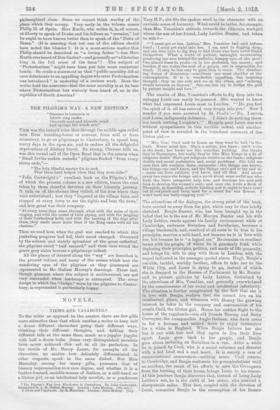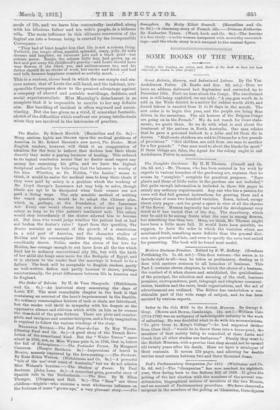NOVELS.
VIEWS AND VAG ABOND To the critic as opposed to the creator, there are few gifts more attractive than that which enables a writer to keep half a dozen different characters going their different ways, thinking their different thoughts, and talking their different talk at the same time, much as a juggler juggles with half a dozen balls. Some very distinguished novelists have never achieved this art in all its perfection. In the novels of Mr. Henry James, for example, all the characters, no matter how delicately differentiated in other respects, speak in the same dialect. But Miss Macaulay, among her many gifts, possesses that of literary impersonation to a rare degree, and whether it is a feather-brained, amiable woman of fashion, or a mill-hand, or a Girton girl, or an intellectual lady novelist, or a ponderous
The Pilgrint's Way from Winchester to Canterbury. By Julia Cartwright. Illustrated by A. H. Hallam Murray. London : John Murray. [l5s. net.] t Views and Vagabonds. By It. macauray. London : John Murray. [es.]
Tory M.P., she fits the spoken word to the character with an enviable sense of harmony. What could be better, for example,
than Mrs. Venables's attitude towards the illiterate workgirl whom the son of her friend, Lady Lettice Bunter, had taken to wife P-
" must get at her, Lettice,' Mrs. Venables had said .before-
hand ; must got right into her. I atn used to digging deep ; and one does have to dig deep to find those who have never found themselves. What a world of patient, untaught, unreasoning pondering one sees behind the pathetic, hungry eyes of the poor ! Ono almost fears to probe—it is too profound, too sacred ; and besides, if one wakes the soul of a people, one is responsible for much. It may be less easy to quiet than to rouse. The slumber- ing forces of democracy—sometimes one must shudder at the contemplation. It is a wonderful, appalling, but inspiring thought—they on one side and we on the other, and "echoing straits between us thrown." One can but try to bridge the gulf by patient insight and love.'"
The results of Mrs. Vena,bles's efforts to dig deep into the unhappy Louie can easily be guessed. She wanted to know what had impressed Louie most in London. " ' Do you feel the spirit of it all has entered very deeply into you P Now I wonder if yon were arrested by St. Paul's.'— No, I never,.
said Louie, indignantly defensive. I didn't do.nothing there nor touch nothing I oughtn't.'" Happily poor Louie was not without sytnpathisers in this terrible ordeal, and another
point of view is revealed in the trenchant comment of the Girton girl t-
"' Mrs. Vert,' Cecil said to Louie as they went to bed, 'is the limit, Never mind her. She's a Totter, you know ; can't write in the least; her books are like semolina pudding. She thinks they're Ibsonesque, but really they're like Miss Yongo in a fit of religious doubt. She's got religious doubts on the brain ; religious doubts and moral certainties and social problems. She told me once that life contains three categories—the things one knows, the things one can't know, and the things one's got to try and do —make our lives sublime, you know, and all that. And about every two years she brings out a novel about some awful ass who finds the three categories help him, and develops his soul and tries to develop the woman's soul ; and once she wrote a Book of Thoughts, in beautiful, artistic binding, and it ought to have come out in red plush and been used for a stand for wax flowers. I won't have her bully-ragging you.'" The attractions of the dialogue, the strong point of 'the book, have carried us away from the plot, which may be thus briefly
sketched. Benjie Bunter, who has been brought up in the belief that he is the son of Mr. Mervyn Bunter and his wife Lady Lettice, reacts against his family environment while at Cambridge, embraces Socialism and Secularism, becomes a village blacksmith, and, resolved at all costs to be true to his principles, marries a mill-hand, not because he is in love with her, but because he is "a logical ass." He remains on excellent terms with his people, of whom he is genuinely fond, while deploring their principles, politics, and mode of life generally, and brings his wife to stay with them in London, with the sequel indicated in the passages quoted above. Hugh, Benjie's amiable, tactful, worldly brother,, offers to take her to the White City, and Louie is dying to go, instead of which. she is dragged to the Houses of Parliament by Mr. Bunter and. to picture galleries by Lady Lattice, victimized by
the attentions of Mrs. Venables, and generally overwhelmed by the consciousness of her social and intellectual inferiority. The situation is further complicated by the fact that she is in love with Benjie, realizes that she cannot live on his intellectual plane, and witnesses with dismay the growing
interest he takes in the company and conversation of his cousin Cecil, the Girton girl Hence her sudden flight to the house of the vagabonds—our old friends Tommy and Betty Crevequer, the irresponsible Anglo-Italians, who have come
in for a fortune and settled down to enjoy themselves for a while in England. When Benjie follows her she has it out with him and they agree to live their lives apart. Louie goes back to her people, and Benjie goes about lecturing on Socialism in a van. After a while he is joined by Cecil, who is a social reformer and theorist with a hot head and a cool heart. It is merely a case of unconventional camaraderie—nothing more. Cecil returns to Cambridge, and Benjie continues his perambulations until an accident, the result of his efforts to save the Crevequers from the burning of their house, brings Louie to his rescue. At.this juncture Benjie discovers that, instead of being Lady. Lettiee's son, he is the child of her sister, who married a disreputable sailor. This fact, coupled with the devotion of Louie, reconciles Benjie to the resumption of his former
anode of life, and we leave him contentedly installed, along with his bibulous father and his wife's people, in a hideous villa. The main influence in this ultimate conversion of the logical ass into a human being is exerted by the irresponsible Crevequers :—
"They had at least taught him that life is not a solemn thing. Pathetic, yes, tragic often, squalid, splendid, crazy, jolly, lit with dreams and laughter, an immense joke and a black grief—but solemn never. Benjie, the solemn little boy, had grown up at last and put away his childhood's gravity—and Leslie should have wax flowers if she liked, yes, and antimacassars too, and his father should do no stroke of work, but smoke and drink and loaf and talk, because happiness counted so awfully much. . • ."
This is a ourious, clever book in which the one simple and sin- cere nature, that of Louie the mill-hand, and the indolent, irre- sponsible Orevequers show to the greatest advantage against a company of shrewd and amiable worldlings, faddists, and social experimentalists. Miss Macaula,y's detachment is so complete that it is impossible to ascribe to her any definite
aim. Her handling of incident is often wayward and uncon- vincing. But she has given us a vivid, if somewhat fantastic, sketch of the difficulties which confront our young intellectuals when they are involved in the intricacies of practice.











































 Previous page
Previous page